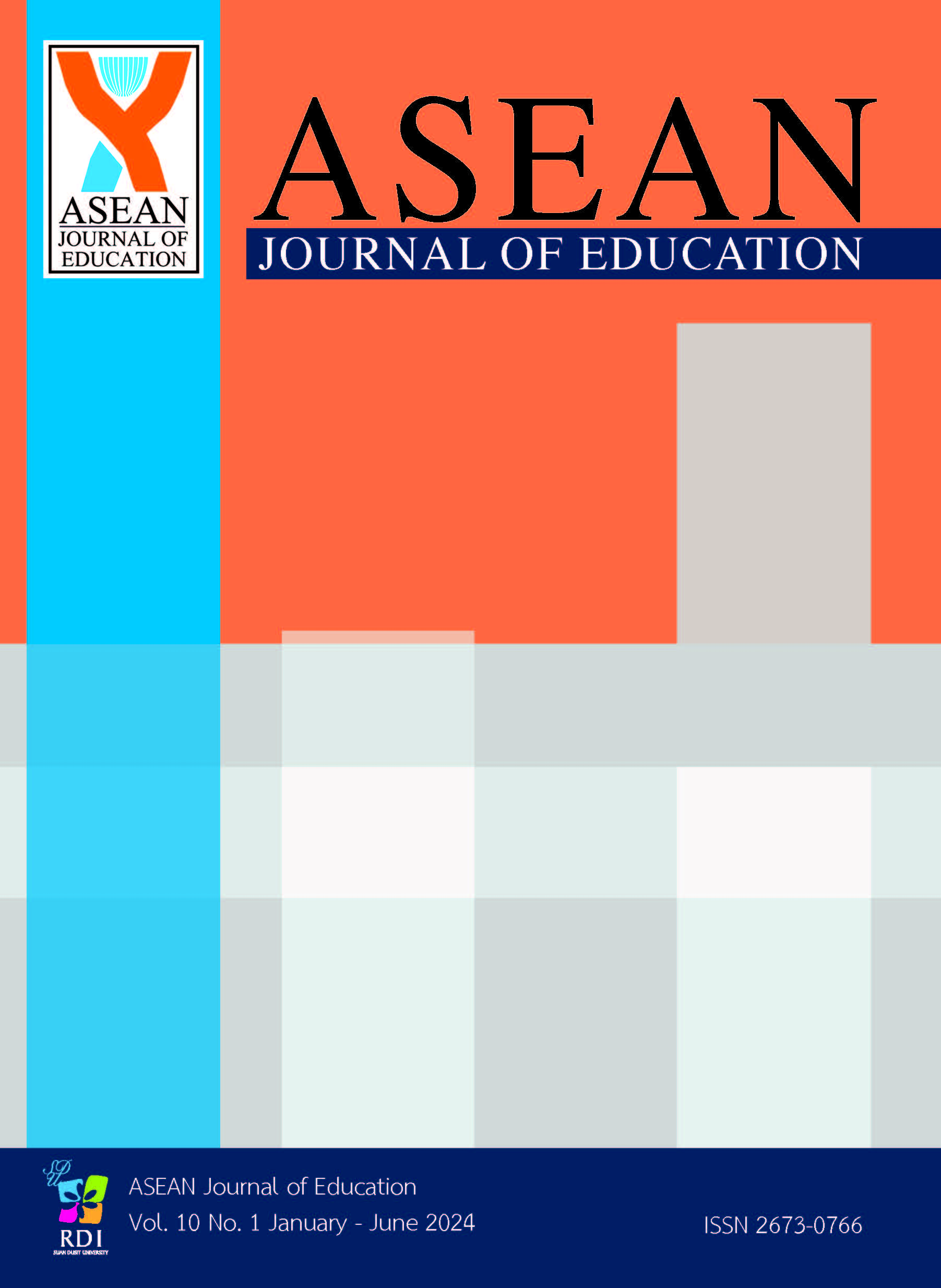Strategy to Promote Student’s Reading and Writing Skills in Small Schools under Bangkok Metropolitan Administration
Keywords:
Strategy, Reading and writing skills, Small schoolsAbstract
The objectives of this research were to achieve three main goals: 1) to investigate the reading and writing conditions of students in small schools under the Bangkok Metropolitan Administration, 2) to analyze factors influencing these conditions and develop strategies to promote reading and writing skills, and 3) to evaluate the suitability and feasibility of these strategies in small schools under the Bangkok Metropolitan Administration. The research employed reading and writing evaluations, interviews, and questionnaires as instruments. The findings revealed that 1) result of the literacy and writing skills of most students were at a fair level, with more than 50 percent showing improvement. 2) the factors affecting students' literacy in the Thai language were generally at a high level. When considering each factor individually, it was found that the school factors and environmental factors had the highest average impact, followed by the influence of teachers. Strategies to promote student’s reading and writing skills in small schools under Bangkok Metropolitan Administration consist of four main strategies as follows: 1) management that facilitates the development of reading and writing, 2) enhancement of learning management to improve reading and writing, 3) development of technology and learning resources to support literacy, and 4) collaboration in developing reading and writing skills. The first strategy includes 7 strategies and 8 goals, the second strategy includes 5 strategies and 5 goals, the third strategy includes 3 strategies and 3 goals, and the fourth strategy includes 3 strategies and 3 goals. The overall appropriateness of the strategies to promote literacy skills in students was rated at the highest level.
References
Anderson, N. (1999). Exploring second language Reading: Issues and Strategies. Boston: Heinle & Heinle.
Carrell, P. L., Davine, J., & Eskey, D. F. (1989). Interactive approaches to second language reading. Cambridge: Cambridge University Press.
Certo, S. C., & Peter, J. P. (1991). Strategic management: Concept and applications. New York: McGraw-Hill.
Chaimusik, S. (2002). Preparation of educational institution level strategic plans. Bangkok: Bookpoint 72.
Chobsri, K. (2018,). Study of Factors Affecting the Reading and Writing Abilities of Grade 3 Students Affiliated with the Educational Area Office in Ratchaburi District 1. Journal of Humanities and Social Sciences, Rajabhat Suan Sunandha University, 1(2), 6-17.
Department of General Education. (2001). Educational development planning at the provincial level. Training documents for provincial education planning officials. (copy).
Department of Education. (2022). Basic Education Development Plan, Bangkok, 3rd Edition (2022-2026). Bangkok: Wannifyday.
Department of Education. (2023). Bangkok Metropolitan Education Management Report, 2022. Bangkok: Nine Graphic.
Kamhi-Stein, L. D. (2003). Reading in two languages. How attitudes toward home language and beliefs about reading affect the behaviors of “Underprepared” L2 College reading. TESOL QUATERLY, 37(1), 35-71.
Kheawtuein, S., & Watcharasin, P. (2021). A study of factors affecting the measurement and evaluation of reading, analytical thinking, and writing of schools at the basic education level. Under Bangkok: Analyzing the Impacts. Suan Dusit Graduate School Academic Journal Suan Dusit University, 17(2), 129-150.
Lektrakul, C. (2010). A study of word reading ability and interest in reading of primary school students. 3rd year with hearing impairment from using the reading skills development kit. Master of Education, Srinakharinwirot University.
Maneelek, R. (2002). Development towards basic education standards: strategic planning in educational institutions. Bangkok: Serimsin Print Press System.
Mansetthawit, S. (2004). Principles and Methods of Teaching Thai Reading. Bangkok: Thaiwattanapanich.
Ministry of Education. (2008). Core Curriculum for Basic Education, Buddhist Era 2551. Bangkok: Thai Agricultural Cooperative Federation.
Office of Academic Affairs and Educational Standards. (2003). The instructional curriculum guide. Bangkok: Kurusuksapha Ladprao.
Office of the Basic Education Commission. (2005). The Role of School Administrators in Education Quality Improvement. Bangkok: Ministry of Education.
Office of the Basic Education Commission. (2014). Announcement of policy for the year 2015, the year of no students who cannot read, cannot read or write. Official letter No. STH 04010/ W 1844 dated 26 December 2014.
Ratanaphinyowanit, T. (2023). Developing Teacher Competencies in Small-Sized Educational Institutions to Enhance Students' Reading and Writing Abilities through Community-Based Professional Learning. Journal of Teacher Professional Development, 4(3), 125-140.
Somprayoon, W. (2001). Teaching Thai language at the primary level. Bangkok: Thaiwattanapanich. Sukying, F., Sujinpraham, P., Muangkao, N., &. Nuannim, P. (2012). The art of Writing Professionally. Bangkok: Aksorn Charoenthat.
Sunthornroj, W. (2006). Educational Development. Mahasarakham: Mahasarakham University.
Thongwiset, N. (2018). Developing Learning Process Models to Address Reading and Writing Problems of Grade 1 Students Affiliated with the Educational Area Office in Mukdahan. Journal of Humanities and Social Sciences Thonburi University, 13(2), 35-46.
Yokhai, S. (2018). Strategies for improving student literacy in small schools Under the Phichit Primary Educational Service Area Office, Area 2. Institute for the Development of Teachers, Faculty, and Educational Personnel. Office of the Permanent Secretary, Ministry of Education.
Downloads
Published
How to Cite
Issue
Section
License

This work is licensed under a Creative Commons Attribution-NonCommercial-NoDerivatives 4.0 International License.
1 All articles will undergo a formal peer-review. A panel of experts from within or without the university will examine the article; approval from a minimum of two experts is required for publication. Revisions posed by the experts must be completed by the research prior to publication.
2 Once published in the ASEAN Journal of Education, the article becomes intellectual property of Suan Dusit University. Duplication, in full or part, requires permission from Suan Dusit University.
3 Excluding errors incurred during printing, author(s) are responsible for the content of their articles.






